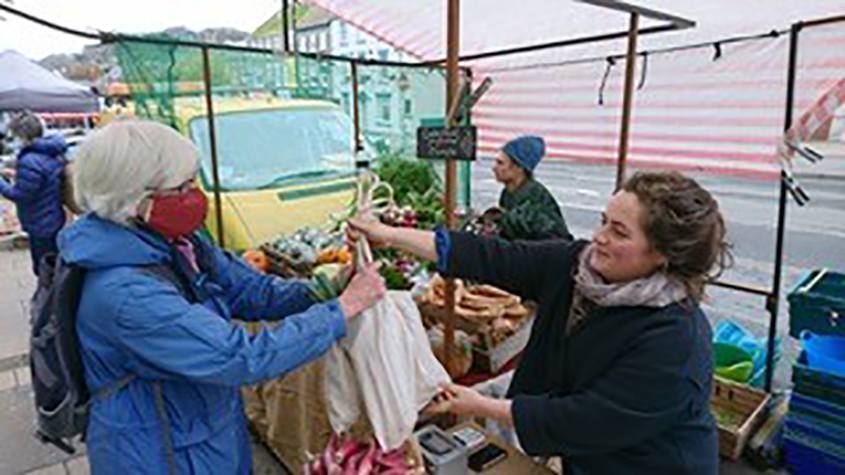There are many aspects of the Covid and climate crises where you may feel disempowered, dependent on government responses. However, food security is an issue where individuals and communities have scope for positive action now!
Britain’s food self-sufficiency has declined from 80% to 60% in the past thirty years. We’re especially vulnerable on vegetables and fruit. Many experts expect worsening food shortages due to climate change, and on top of that we can add threats from Brexit, Covid and more.
In early 2020, Seeding our Future started a project in my home town, Bridport, to explore how this community can improve its food security. We hope this will be a pilot project from which other towns and cities can learn.
This blog gives you an overview of how we’ve approached our local community and what we’re hoping to evolve. You can find fuller information, and sign up for our e-newsletters, at https://www.seedingourfuture.org.uk.
Who and how
For any pioneering initiative, it helps to have a small team: working alone on something like this is depleting. At the outset, I recruited three colleagues, working a few hours per week, at a modest pay rate which I’m funding from money in a charitable trust. Between us, we have a lot of experience and connections in the local community and food sector.
One way we’ve developed our project is through meetings open to anyone in the local community: initially in person, then online when Covid happened. These have brought in new ideas and offers of help, such as access to grant funding. You have to accept that most community initiatives are time consuming. Along with the big open meetings, we’ve had many smaller ones. And we’ve had a common challenge with such projects, of whether to get involved in related issues, such as providing more land for allotments, or healthier food in hospitals.
We’ve had to be patient, to listen very attentively to other voices in this community, and keep reshaping the project to find the best fit. We have sometimes met with prejudice, vested interests or grumpy people. My tactic is usually to go sideways or upwards, not confront them. Sideways means help form opinion-leading organisations or individuals who may have more influence than us newcomers. Going upwards means seeking a higher shared value, an accepted general principle, or an authority figure, that can lift us above the apparent point of tension.
Another ingredient that has advanced our work is research. For example, I commissioned a substantial report which shows how producers and consumers in South West England can adapt to future climate conditions, through changes in cultivation methods, crops, and diet. This is available as a free download here. The biggest challenge we face is a systemic one: most people have difficulty changing habits or investing effort to prepare for a problem before it hits them.
Outcomes and hopes
After a year, on a shoestring budget, I think we’ve done well. Here’s some of the progress from 2020:
- Wider awareness of climate change threats among local organisations and individuals.
- Several well-attended briefing and consultation events, helping to clarify shared priorities and form our plans for 2021 and beyond.
- We’ve evolved ideas for a local food hub as a catalyst. Initially this will happen online and with pop-up events, but medium term we aim for a physical venue. Key elements include information resources and education as entertainment, including affordable cookery classes.
- Good working connections, especially with our two partner organisations: Bridport Local Food Group and Transition Town Bridport.
- Ambassador Allotments set up: these are people already using climate-adaptive crops and methods, willing to share their experience.
- One grant received, and potential for other funding sources.
Our plans for 2021 feel soundly based on the consultations and debates last year. The main initiatives we hope to take forward this year are:
- Encourage home growing, through more information resources, and open allotment events.
- Implement or try out elements of the ‘Food Hub’ concept, including a website led by the Local Food Group.
- Increase local production of vegetables and fruit connecting landowners, new growers and seed funding.

